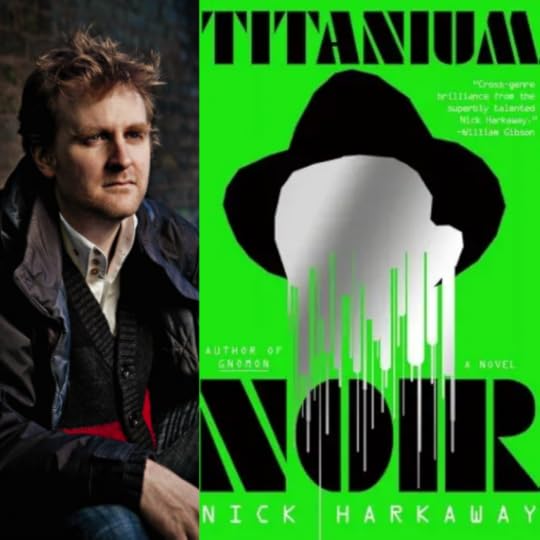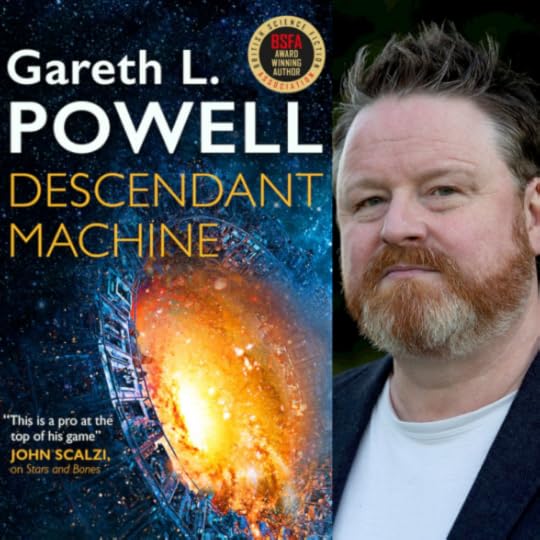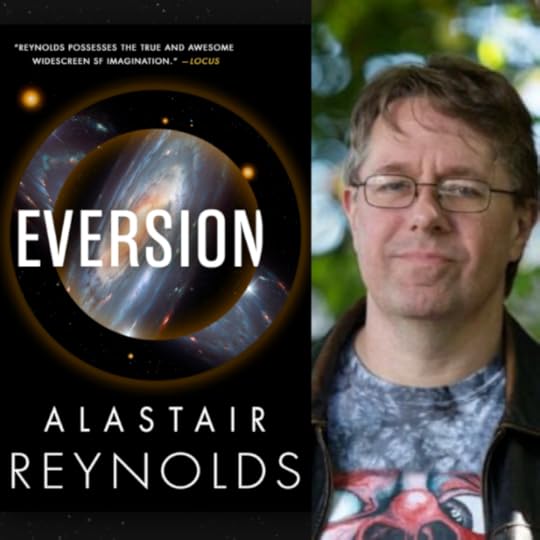Rob Wolf's Blog
August 4, 2023
Being Hard-Boiled and Cynical among Long-Lived Giants in Nick Harkaway’s Titanium Noir
According to Merriam-Webster, noir is “crime fiction featuring hard-boiled, cynical characters and bleak, sleazy settings.” The Cambridge Dictionary says noir shows “the world as being unpleasant, strange, or cruel.” Nick Harkaway‘s new novel Titanium Noir (Knopf, 2023) has all that but with a twist—rather than the fedora-wearing detective hired by a woman who’d just as soon stab you in the back as love you, the first-person narrator is P.I. Cal Sounder, hired by the police to help investigate the murder of a 7’8”, 91-year-old man who by all rights could have lived several more centuries.
Sounder’s specialty is investigating crimes against Titans, the one percenters among one percenters, whose access to an exclusive medical treatment known as Titanium 7 enlarges both their bodies and their lifespans.
The story is set hundreds of years in the future, when such miracle treatments become possible, but the book also sends roots into the past. The murder weapon, for instance, is a .22 Derringer, a small handgun not too different from the weapon used to assassinate Abraham Lincoln.
“Killing someone with a gun is noir. Every poster of a noir movie is someone with a gun, whether it’s a shadow with a revolver or a kind of Rico Bandello in Little Caesar. The gun is bound up with noir and vice versa,” Harkaway tells Brenda Noiseux and me in the new episode of New Books in Science Fiction.
Nick Harkaway is the pen name of Nicholas Cornwell. As Harkaway, he is the author of the novels The Gone-Away World, Angelmaker (which was nominated for the 2013 Arthur C. Clarke award), Tigerman, Gnomon; and the non-fiction The Blind Giant: Being Human in a Digital World. He has also written two novels under the pseudonym Aidan Truhen. His father wrote under the pen name John le Carré.
Read an Excerpt from the Episode on LitHubJuly 7, 2023
Aliens Might Not be as Scary as You Think, according to Karen Lord’s The Blue, Beautiful World
In science fiction, aliens who come to Earth are usually scary and menacing, aspiring to destroy, conquer, or even eat mankind. But the aliens in Karen Lord’s The Blue, Beautiful World aren’t interested in conquering or destroying; they’re interested in inviting Earthlings to join a Galactic Council.
It turns out, however, that humans need a little time and training before they’re ready to assume the responsibilities of galactic citizenship. And complicating matters is the fact that humans might not be the only Earth dwellers to receive the aliens’ invitation.
It’s not surprising that water and oceans figure prominently in Lord’s novel. As a Barbadian writer, she has a lifelong respect—and fear—of the water.
“I’m kind of terrified of the ocean,” Lord told me on the latest episode of New Books in Science Fiction. “To give you context, there is literally a part of the island that you can drive to and look around and see three coastlines. But you can’t see any other land from any of the coasts. It’s an oddly isolating feeling, like you’re standing tiptoe on a small rock—and you could tip over and crash into the ocean anytime.
“I love living here, but when something bad goes down, it’s like, boom, all of a sudden you realize the ocean is not your natural habitat. It’s not making things easy for you. We are very much living on the skin part of land. We don’t know the ocean. We don’t know the surface of the ocean. We don’t know the depths of the ocean. There is a huge level of respect and mystery that the ocean commands.”
The Blue, Beautiful World is Lord’s fifth novel. Her previous books are Redemption in Indigo, which received the William L. Crawford and Mythopoeic Fantasy Award for Adult Literature and was nominated for the World Fantasy Award for Best Novel. That was followed later by a sequel, Unraveling. While The Blue, Beautiful World is considered a standalone story, it is set in the Cygnus Beta universe, which is where two of her previous books, The Best of All Possible Worlds and The Galaxy Game, are also set.
Read an Excerpt from the Episode on LitHubKaren Lord on Sharing Realities Between Humans, Other Species, and Aliens
May 4, 2023
In Gareth L. Powell’s Descendant Machine, a Mysterious Mechanism Could be Key to a Civilization’s Rebirth… or the Universe’s Destruction
Gareth L. Powell’s Descendant Machine is set about 200 years in the future, and yet the recent explosion in A.I. technology suggests Powell’s imagined future—in which the minds of humans and A.I.s are symbiotically enmeshed—is just around the corner.
The Bristol author’s new novel centers around a mysterious machine called the Grand Mechanism, an impenetrable black sphere, which, about two thousand years ago, replaced a star in a binary system. The system is home to a humanoid, multi-armed species known as the Jzat, who are divided among those who want to crack open the Grand Mechanism, believing it contains a wormhole to connect them with a more advanced Jzat civilization, and those who want to leave the mechanism alone, fearing it contains a black hole or other existential danger.
“I got a bit satirical with the way the faction is appealing to nationalism to get the power they need to open this thing by promising sunlit uplands and making Jzat great again,” Powell explains to Brenda Noiseux and me on the new episode of New Books in Science Fiction. “It’s like any scientific experiment, any scientific knowledge that sentient beings see. It’s a process of just poking stuff to see what happens. Chimpanzees do it, and crows do it. You find something you don’t understand, you poke it and try and break it and see what it can do. And that’s how we learn. And that’s what’s basically happening on a massive scale in this story with this ancient machine that nobody knows what it does, but they want to poke it and see what happens.”
Gareth L. Powell is known for using fast-paced, character-driven science fiction to explore big ideas and themes of identity, loss, and the human condition. He has twice won the coveted British Science Fiction Association Award for Best Novel and has become one of the most-shortlisted authors in the 50-year history of the award, as well as being a finalist for the Locus, British Fantasy, Seiun, and Canopus awards.
Read an Excerpt from the Episode on LitHubGareth L. Powell on AI in Fiction and Our Precarious Position With AI Development Today
March 30, 2023
Leslye Penelope Mixes History and Magic in The Monsters We Defy
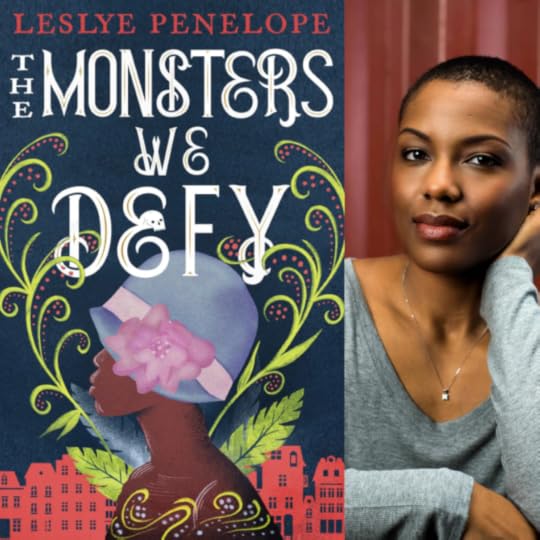
Leslye Penelope’s latest novel, The Monsters We Defy (Redhook, 2022), takes readers to a version of 1920s Washington D.C. where bootleggers, powerful spirits, and humans blessed (and burdened) with enchantments engage in an epic battle over peoples’ destinies.
Penelope’s protagonist, Clara Johnson, is based upon a real person—a woman who, as a teenager during the Red Summer race riots of 1919 shot and killed a police detective after he broke down her bedroom door. Prohibited from arguing self-defense, she was convicted of manslaughter, but a judge later tossed out the verdict.
Penelope found the real Johnson’s exoneration so remarkable that she felt “it had to be magic.” As she puts it, “How did this young Black girl get out of that situation? If magic was involved, that would make so much more sense.”
The book’s magical elements are layered over D.C.’s dynamic Black community, where Black entrepreneurs, artists and academics thrive even as they face racism that is both overt (the Ku Klux Klan holds a demonstration) and systemic (Woodrow Wilson had segregated the federal workforce a few years earlier). The magic echoes the hope and horror of the real world, providing Penelope’s characters with the power to save themselves and their community—but at a painful price.
Leslye Penelope is an award-winning author of fantasy and paranormal romance. Her debut novel, Song of Blood & Stone, was chosen as one of TIME Magazine’s 100 Best Fantasy Books of All Time. The novel also won the inaugural award for Best Self-Published Fiction from the Black Caucus of the American Library Association.
Read an Excerpt from the Episode on LitHub
Leslye Penelope on the Historic 1919 Trial That Fueled Her New Magical Heist Novel
February 2, 2023
In Where It Rains in Color, Denise Crittendon Bases a Color-rich Utopia on Her Real Life Sojourn in Zimbabwe
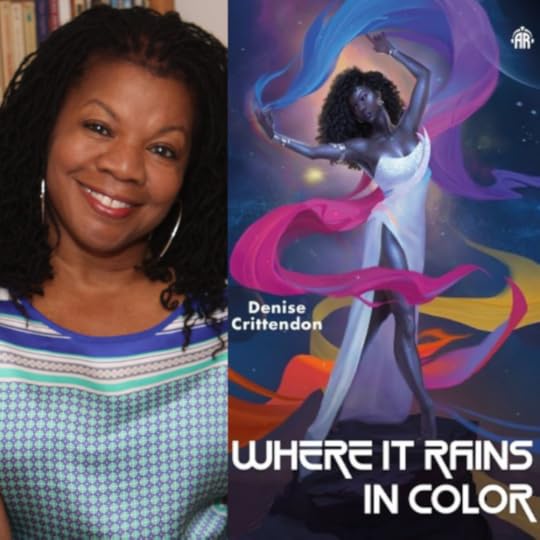
Denise Crittendon’s debut science fiction novel, Where it Rains in Color, is set far in the future, long after the Earth has been destroyed, on the planet of Swazembi.
Swazembi is a color-rich utopia and famous vacation center of the Milky Way. No one is used to serious trouble in this idyllic, peace-loving world, least of all the Rare Indigo. But Lileala’s perfect, pampered lifestyle is about to be shattered.
Published on the cusp of Crittendon’s 70th birthday, the novel’s creation was decades in the making. Ideas were jotted down and relegated to a drawer while her work as a journalist and ghostwriter took front seat. Inspiration was gathered from her time in Zimbabwe and a recurring dream she had over many years.
“The dream influenced the novel a great deal,” Crittendon tells Brenda Noiseux and me on the latest episode of New Books in Science Fiction. “The novel was kind of built around the dream. When I finally started writing it again, then the dreams came back. And then I stopped and the dreams went away. When I finally got a chance to do that final push, I never had a dream again.”
That experience layers an almost metaphysical presence to a story that already includes a different kind of worldbuilding from what we normally see in science fiction. From Swazembi’s galaxy-renowned wind-force public transit system and nuanced cultural greeting of “waves of joy” to the noted lack of violence throughout, the novel offers a fresh perspective on what sci fi can be.
Before making the big leap into the world of sci-fi & fantasy, Denise Crittendon held a string of journalism jobs. In addition to being a staff writer for The Detroit News and The Kansas City Star, she was editor-in-chief of the NAACP’s national magazine, The Crisis. Later, she became founding editor of a Michigan-based lifestyle publication for black families. After self-publishing two manuals that empower youth, “Girl in the Mirror, A Teen’s Guide to Self-Awareness” and “Life is a Party That Comes with Exams,” she entered the new-age healing movement as a motivational speaker for teens. These days, she fulfills ghostwriting assignments for clients and writes speculative fiction on the side. She divides her time between Spring Valley, Nevada and her hometown, Detroit, Mich.
Read an Excerpt from the Episode on LitHubJanuary 5, 2023
Annalee Newitz Redefines Peoplehood, Democracy and Love in The Terraformers
 Photo: Sarah Deragon
Photo: Sarah DeragonIn their new novel, The Terraformers, Annalee Newitz leaps 60,000 years into the future, redefining ideas of peoplehood, democracy and love.
A diverse array of characters—hominids, animals, and objects that in 2023 are still considered inanimate, such as doors and trains—are “people” in this multi-generational story about a corporation terraforming their privately-held planet Sask-E and their workers (which the corporation owns as part of their “proprietary ecosystem development kit,”) who want to turn Sask-E into a public, democratically-governed territory.
The plot tracks the nitty-gritty of building complex things—environments, relationships, governments—as Sask-E evolves over thousands of years into a pseudo replica of Pleistocene Earth. Newitz’s heroes are members of the Environmental Rescue Team, an interplanetary force of first responders and environmental engineers who keep ecosystems in balance and stage disaster rescues. Apart from a fanciful invention called a “gravity mesh,” which allows some characters to fly, Newitz—who is also an award-winning writer of non-fiction—grounded the story in science.
“I really did try to have a very grounded, scientifically accurate approach to ecosystems. For example, when Destry, my network analyst, connects to the environment, she has these sensors in her hands, which allow her to read a vast sensor network all over the planet. The Environmental Rescue Team has scattered these tiny, microscopic biodegradable sensors so that they can read the health of the trees, soil, insects, everything. So it gives Destry this almost magical connection to the planet Avatar-style, except it’s not some hokey Tree-of-Life thing. It’s just a sensor network, much like sensor networks that we’re developing now on Earth and using in a lot of places.”
Annalee Newitz writes science fiction and nonfiction. They are the author of Four Lost Cities: A Secret History of the Urban Age and Scatter, Adapt and Remember: How Humans Will Survive a Mass Extinction, which was a finalist for the LA Times Book Prize in science. They’re also the author of the novels The Future of Another Timeline, and Autonomous, which won the Lambda Literary Award. As a journalist, they are a writer for the New York Times and elsewhere, and have a monthly column in New Scientist. They are also the co-host of the Hugo Award-winning podcast Our Opinions Are Correct. Previously, they were the founder of io9, and served as the editor-in-chief of Gizmodo.
Read an Excerpt from the Episode on LitHubAnnalee Newitz on Writing Stories That Reveal a Pathway Out of Dark Times
November 2, 2022
Alastair Reynolds Takes Readers on a Journey Through Time and Psyche in Eversion
In Alastair Reynolds’ Eversion (Orbit, 2022), the setting keep changing—the epoch, location, and technology—but the characters remain more or less the same as they carry out an expedition to a mysterious object at the behest of a private investor.
The novel starts on a tall ship in the early 1800s in waters in the Arctic, then jumps to a paddle-steamer near the Antarctic, then a dirigible over Antarctica, and eventually concludes in the future on a submarine-like explorer under the ice of Europa, the Jupiter moon.
The story is a puzzle, challenging the reader to figure out which if any place and time is real. Adding to the mystery is the reader’s dependence on a first-person narrator Silas Coade, the expedition’s physician. Is the story a book he is writing, a delusion, a series of alternate realities or something else?
In our conversation on the new episode of New Books in Science Fiction, Reynolds tells Brenda Noiseux and me that his original intention with Eversion was to “recap the entire history of science fiction … We were going to start in a kind of Mary Shelley, Edgar Allan Poe mode. And then it was going to go into sort of Jules Verne and then maybe a bit of H.G. Wells, then a sort of early pulp sleuth thing.” That would have been followed by classic space opera and episodes in the styles of Robert Heinlein, Arthur C. Clarke and Isaac Asimov followed by 1960s and ’70s new wave.
“But once I started writing the book, I realized that there was no way I could bring sufficient variety to the craft to make those episodes work,” he says. “So I cut it down drastically to four or five episodes for the finished product.
Reynolds is a former research fellow at the European Space Agency. He’s been writing fiction full-time since 2004 and has 19 novels and more than 70 short stories to show for it. His work has been shortlisted for the Hugo, Arthur C Clarke and Sturgeon awards. He’s won the Seiun, Sidewise, European Science Fiction Society and Locus awards, and his stories have been adapted for stage and television.
Read an Excerpt from the Episode on LitHubAlastair Reynolds on Trying to Encompass the Entire History of Science Fiction in One Novel
September 7, 2022
In Joma West’s Face, climbing the ladder is everything
People have always cared about their social status and how others perceive them, but advances in technology have changed how we ascend the social ladder, giving us new tools to manipulate our image and new measures of success as we seek “friends,” “likes” and the ever-elusive virality.
In Joma West’s debut novel Face, climbing the ladder is everything. The way you act and dress, who you couple with, how you move and talk—it all adds up to “face,” which, in turn, determines your job, where you live, who you befriend and the quality and quantity of opportunities available to you. Every second—at home, in public or on the “In”(ternet)—is carefully choreographed. It’s a cold world, where even children are curated to advance social standing.
With everyone—even enslaved “menials”—hiding their thoughts and feelings, people turn to anonymous confessors to express their emotions. Through a Rashomonic narrative where the reader re-experiences the same scenes from different characters’ points of view, West reveals the tensions underlying every interaction and the emotional cost of living in a society that values external success over internal well-being.
“Face is a game, a way of life, a survival mechanism,” West says. “It’s essentially everything that you are when you’re on the hierarchy. If you’re a menial you have no face, so it doesn’t matter, but if you’re someone on the social ladder of any kind, your face is everything. And it is what ensures that you are at the level that you’re at, and it also ensures how you climb the ladder as well.”
Read an Excerpt from the Episode on LitHubJoma West Talks About Reputation, Hierarchy and Touch, as Told Through Her Dystopian Novel Face
August 10, 2022
Society Conspires Against Those Who Try to Spread Their Wings in Megan Giddings’ The Women Could Fly
 (Photo: Jon Cameron)
(Photo: Jon Cameron)
https://traffic.megaphone.fm/NBN3410067639.mp3
The Women Could Fly is set in our contemporary world with one big difference. A belief in witches gives rise to laws and a culture that encourages women to be married by the age of 30, locking them in a 1950s-style domesticity with the threat that they can be burned at the stake for merely being accused of violating the rules.
In Megan Giddings’ second novel, the reader must first grapple with the question: Are witches real? As the story progresses, the question shifts: Even if witches exist, why are they considered nefarious?
Read an excerpt of the episode featuring Megan Giddings and The Women Could Fly on Literary Hub.
“On a basic level, I just really wanted to write about magic,” Giddings tells me and co-host Brenda Noiseux in the new episode of New Books in Science Fiction. “I wanted to write about a world where anything seems possible, but still people lean into their worst impulses and keep things small. … I wanted to show the ways that people constrain themselves. And I thought magic—something that could be limitless, something that could change anything—was the right way to get in there.”
Megan Giddings is the author of Lakewood. She has degrees from the University of Michigan and Indiana University and is a recipient of a Barbara Deming Memorial fund grant for feminist fiction.
June 9, 2022
In John Scalzi’s New Novel, Kaiju Roam an Alternate Earth
One could call The Kaiju Preservation Society a pandemic novel because a) John Scalzi wrote it during the pandemic and b) the pandemic serendipitously leads the main character, Jamie, to a new job that sets the action in motion.
But the book is not about the pandemic. It’s about Kaiju, Godzilla-like monsters who live in an alternate Earth. This alternate Earth is rich in radioactive elements, and the Kaiju produce energy from their own internal biological reactors. This makes them a danger when, say, they end their lives with in nuclear explosion that thins the walls between Earths, but it also makes them an object of fascination for unscrupulous humans seeking new sources of cheap energy.
“So much of the way plant life and animal life on Earth works is through sunlight, which is just another type of radiation,” Scalzi tells me on the new episode of New Books in Science Fiction. “Plants photosynthesize, animals eat plants, other animals eat the animals that eat the plants and so on and so forth. But sooner or later it all comes back to sunlight. The only places where you don’t have that happen are in very specific places where, for example, there are sulfurous heat sources at the bottom of the ocean. And then things have evolved to take advantage of the energy source there. Well, in this alternate Earth, things like uranium and thorium in the crust are another possible energy source. It makes sense to me that life would evolve to take advantage either wholly or in part of that additional energy source. And then, of course, I just built out from there.”
Scalzi has contributed in myriad ways to the art of science fiction through many novels, his past leadership as president of the Science Fiction and Fantasy Writers of America, and the platform he provides other writers on The Big Idea, a feature that appears regularly on his website. His writing has earned numerous awards, including what was once upon a time known as the John W. Campbell Award for Best New Writer, the Hugo Award for Best Novel, Hugos for Fan Writer and Best Related Book, and the Locus Award for Best Science Fiction Novel.

